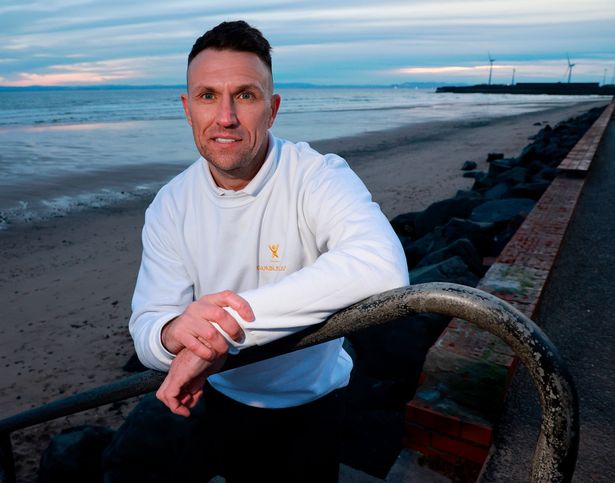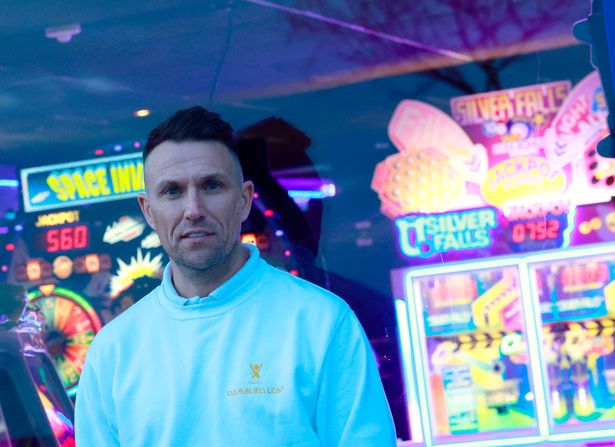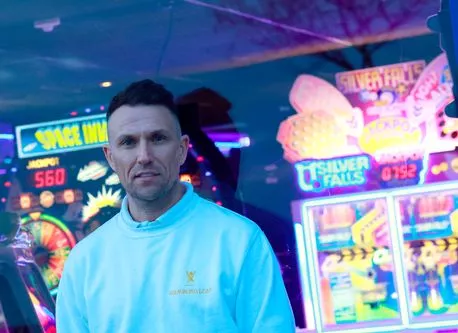A man has admitted to losing more than £250,000 after his gambling addiction spiralled out of control – causing him to empty his bank account every time he got paid.
Colin Brown, 42, said betting had at one point taken over his life despite him trying to stop “at least 200 times”. It comes after a new government measure was confirmed earlier this week, which requires bookmakers and casinos to fund NHS-provided support to tackle problem gambling. It means online stakes, which currently have no limit, will be set at £5 per spin for those aged over 25, and £2 for 18 to 24-year-olds.
A £2 limit will also be introduced on sums that can be staked on online slot machines. Proceeds from the new statutory levy are expected to be around £100m a year – which the government will use to fund research, prevention and treatment of harms associated with gambling.
Colin, who became addicted to gambling at just 15 after he won £4.80 on a slot machine with 50p, says the overwhelming dopamine hit had him returning to the arcade to spend all his entire paper round salary. By the time he was 18, he was taking out dozens of loans and credit cards, and even resorted to stealing from his mother’s purse to fund the habit.

(
Daily Record)
The distillery worker, from Leven in Fife, Scotland, said: “That first win at 15 wired my brain into gambling. After that, I was constantly chasing the dopamine hit. I didn’t have the money for the bets so I started stealing to make sure I could get that buzz.”
Colin began researching and placing bets throughout the day and night – and despite starting Gamblers Anonymous at the age of 20, he would still place bets while attending the meetings, the Record reports. He continued: “It was relentless. I’d only get two hours sleep some nights because I was wired to bets.
“I started Gamblers Anonymous because there was no other option available to me for help. Over the years, I went back five or six times but it didn’t help. I was still gambling on my phone on breaks and in the toilet.”
When he won £12,000 at 22, Colin’s addiction spiralled out of control. He said: “After that big win, I started chasing bigger bets. They changed from £20 to £500. Putting £20 to win £500 wasn’t going to give me the buzz that I needed. I was immune to the dopamine buzz that £20 would give me and I needed to chase the higher one to win the bigger amount, it was like my tolerance got higher.
“That’s when it got out of control. I was giving into gambling every day, I couldn’t defeat it. If I got paid on the Friday, my wages would be gone before I even got to work that day. I’d leave myself with nothing for the rest of the month. I was suicidal every day, I thought that dying would be the only way out for me. I didn’t think recovery was possible because I had tried to stop at least 200 times.

(
Daily Record)
“Over the years, I probably lost over £250,000”, he added. Colin reached a point where he was forced to sell the home he shared with his ex-partner to clear him of his debts, while his mum offered to pay off loans of between £5,000 and £10,000. He said: “The guilt consumed me but at that time, gambling was more important.
“I confided in my family and promised them I’d stop and then I’d get a payday loan. I loved gambling more than I loved anything else so it was the people closest to me that took the brunt of it. It overpowered me every single time.”
The final straw for Colin came last year after he lost £1,500 in three minutes on virtual cricket. He said: “I honestly just thought, enough is enough. I knew I needed to tackle this differently so I started educating myself about the brain and started listening to podcasts from people who had managed to turn their lives around.
“I opened up to more people and released my own podcast where I told my story to the world. The more people I shared with, the more barriers it built for me. More people supported me. I couldn’t hide away from it after that.”
He now runs his own business, Gambling Leap, to offer support to other gamblers through education. Colin feels the new statutory levy on the profits of gambling operators is a “step in the right direction”, but insisted there is still a long way to go.
He said: “It’s a step in the right direction but there are still many, many more to go. It’s great that more NHS clinics and services will be formed to help people who are already addicted, but it won’t get to the root of the problem.
“The profits must go to the right services that provide education on prevention in order for this problem to be fully stamped out. I am, however, glad the government is taking it seriously. It destroyed my life and the relationships I have so I have no doubt it will be doing the same to millions of others across the UK.”
